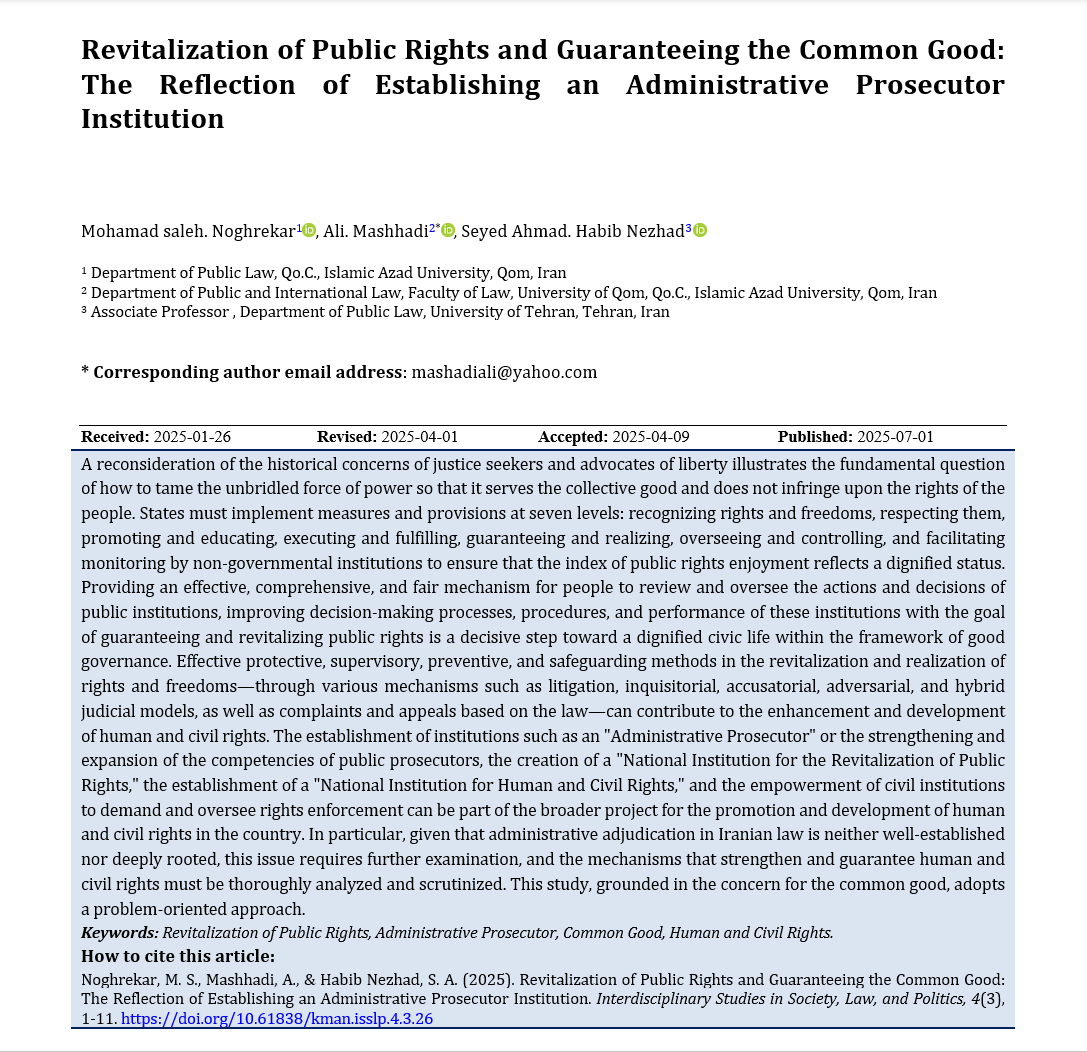Revitalization of Public Rights and Guaranteeing the Common Good: The Reflection of Establishing an Administrative Prosecutor Institution
Keywords:
Revitalization of Public Rights, Administrative Prosecutor, Common Good, Human and Civil RightsAbstract
A reconsideration of the historical concerns of justice seekers and advocates of liberty illustrates the fundamental question of how to tame the unbridled force of power so that it serves the collective good and does not infringe upon the rights of the people. States must implement measures and provisions at seven levels: recognizing rights and freedoms, respecting them, promoting and educating, executing and fulfilling, guaranteeing and realizing, overseeing and controlling, and facilitating monitoring by non-governmental institutions to ensure that the index of public rights enjoyment reflects a dignified status. Providing an effective, comprehensive, and fair mechanism for people to review and oversee the actions and decisions of public institutions, improving decision-making processes, procedures, and performance of these institutions with the goal of guaranteeing and revitalizing public rights is a decisive step toward a dignified civic life within the framework of good governance. Effective protective, supervisory, preventive, and safeguarding methods in the revitalization and realization of rights and freedoms—through various mechanisms such as litigation, inquisitorial, accusatorial, adversarial, and hybrid judicial models, as well as complaints and appeals based on the law—can contribute to the enhancement and development of human and civil rights. The establishment of institutions such as an "Administrative Prosecutor" or the strengthening and expansion of the competencies of public prosecutors, the creation of a "National Institution for the Revitalization of Public Rights," the establishment of a "National Institution for Human and Civil Rights," and the empowerment of civil institutions to demand and oversee rights enforcement can be part of the broader project for the promotion and development of human and civil rights in the country. In particular, given that administrative adjudication in Iranian law is neither well-established nor deeply rooted, this issue requires further examination, and the mechanisms that strengthen and guarantee human and civil rights must be thoroughly analyzed and scrutinized. This study, grounded in the concern for the common good, adopts a problem-oriented approach.
Downloads
References
Afshari, F., & Akbari, M. (2021). The administrative prosecutor in the Iranian legal system: Challenge or opportunity? New Essays in Administrative Law, 1(1), 37-59.
Amir Arjomand, A. (2000). Comparative administrative law: Emergence and evolution of administrative law in France. Shahid Beheshti University, Faculty of Law.
Amir Arjomand, A. (2007). Collection of international human rights documents. Javidaneh Publishing, Jungle.
De Geer, S. (2022). The right to have rights (H. Pirani, Trans. ed.). Tehran: Farhang Publishing.
Emami, M., & Ostovar Sangari, K. (2023). Administrative law. Tehran: Mizan Legal Foundation.
Guise, R. (2017). Public good and private good (H. Afshari, Trans. ed.). Tehran: Markaz Publishing.
Hadavand, M. (2005). Good governance, development, and human rights. Quarterly Journal of Constitutional Law, 3(4), 52-86.
Hamidi, M. R. (2023). The law of the Administrative Justice Court in the current legal system. Tehran: Behnami Publishing.
Hashemi, S. M. (2005). Human rights and fundamental freedoms. Tehran: Mizan Publishing.
Hemmati, M. (2017). Analysis of the law of the Administrative Justice Court from the perspective of specific standards of fair administrative litigation; with a look at the European Court of Human Rights' practice. Public Law Research, 19(55), 245-272.
Judiciary Research Center. (2014). The impact of judicial system reforms on development.
Judiciary Research Center. (2015). Feasibility study for establishing a prosecutor's office in the Administrative Justice Court.
Keykhai Farzaneh, M. A., Najarzadeh, M., & Ahangari, E. (2020). Judicial security. Tehran: Judiciary Research Center, Judiciary Press and Publications Center.
Malmiri, A., & Pateft, A. (2018). The concept and scope of the general principles of administrative law and how to invoke them in judicial proceedings. Tehran: Judiciary Press and Publications Center.
Mashhadi, A. (2024). The law of the Administrative Justice Court in the current legal system. Tehran: Khorsandi Publishing.
Moghaddari, M. (2019). Lessons from good governance. Tehran: Contemporary Look Publishing.
Moulabighi, G., & Mohammadi Ahmad Abadi, H. (2023). Jurisdiction and procedures of the Administrative Justice Court. Tehran: Jungle Publishing.
Mousavi Zadeh Markiyeh, S. S. (2019). Feasibility study for establishing the position of administrative prosecutor. Quarterly Journal of Administrative Law, 7(20), 225-248. https://doi.org/10.29252/qjal.7.20.225
Ostovar Sangari, K. (2023). Administrative litigation law. Tehran: Datik Publishing.

Downloads
Additional Files
Published
Submitted
Revised
Accepted
Issue
Section
License
Copyright (c) 2025 Mohamad saleh Noghrekar, Ali Mashhadi, seysd ahmad Habib nezhad (Author)

This work is licensed under a Creative Commons Attribution-NonCommercial 4.0 International License.





